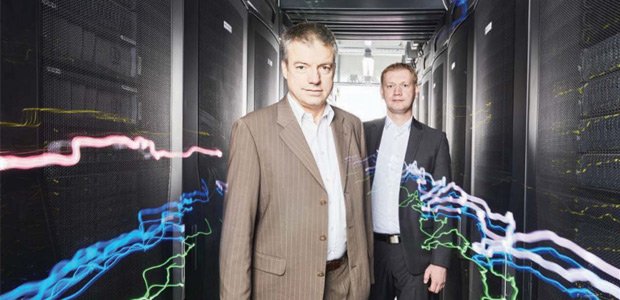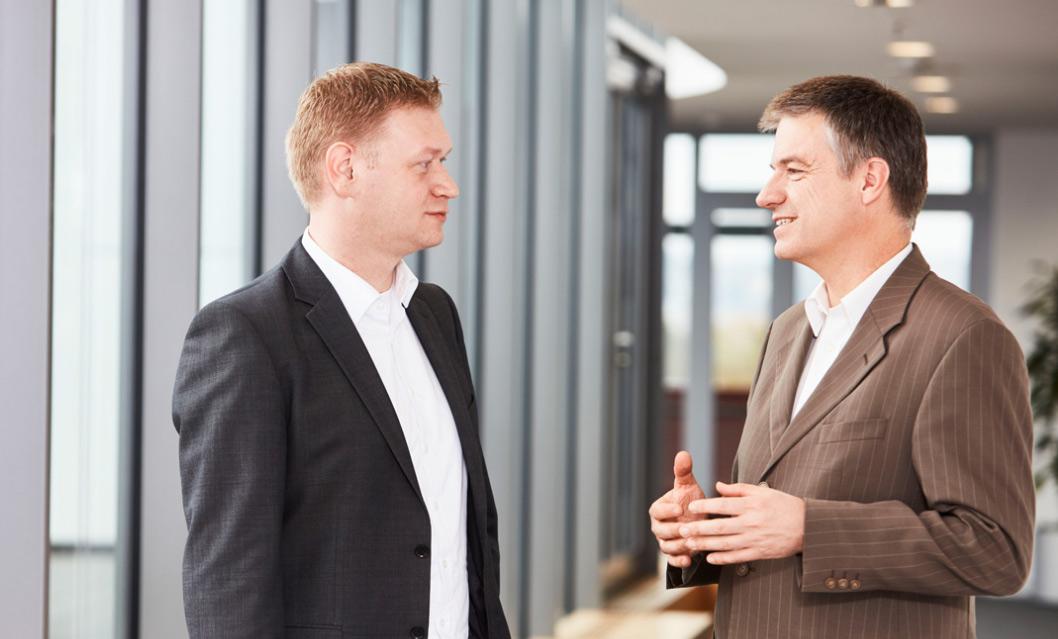Make the Energy World Invulnerable to Cyberattacks

Decentralized, digital, networked – in the new energy world, various players constantly exchange information to ensure that clean electricity is always available to and affordable for everyone. But how secure is this system? Prof. Bernd Engel, an expert in sustainable energy systems at the Technical University of Braunschweig, and Marek Seeger, Information Security Manager at SMA, discuss the risks and opportunities of the digital energy revolution.
Energy supply structures are changing all over the world. Energy companies are being split up and realigned, while more and more people and companies are gaining independence with self-generated electricity. In this context, experts often talk about the “digitization of the energy transition.” What exactly does this involve?
Bernd Engel: The electricity supply of the future will be almost entirely based on renewable energy sources and will therefore be environmentally friendly and free of pollutants – while also providing the same level of supply reliability and falling electricity prices. All around the world, wind and photovoltaic systems can increasingly produce energy more cost-effectively than new conventional power plants. They feed power into the utility grid on a decentralized basis whenever the sun is shining or the wind is blowing. For this reason, decentralized generators, storage systems and major flexible loads, such as electric vehicles and heat pumps, need to be managed in a targeted way. This allows them to consistently balance generation and consumption in the utility grid. For this to be successful, we need more communication links, including with small- and medium-sized generation plants. So far, only large-scale plants have been integrated into the grid operators’ special communication networks. In the future, however, smaller plants will also be able to directly participate in the energy market by pooling in “virtual power plants,” enabling them to supply electricity to consumers cost-effectively and directly, without having to go through electric utility companies. A fast and secure exchange of information between generators, consumers, grid operators and other players using modern communication channels thus forms the backbone of the future energy supply.
Many new opportunities are arising for generators and consumers
What effects will this have on consumers?
Bernd Engel: Increasing digitization will offer companies and private consumers more and more opportunities to get involved in shaping the energy transition: initially passively through their consumption patterns and later increasingly by also actively participating in the electricity markets. Consumers who also have their own PV systems can sell the electricity they do not use themselves directly over the Internet. If they also own a storage system, they can make the storage capacity available to offset generation and consumption in the utility grid in exchange for a fee. Through targeted management of their electrical appliances, it is also possible to take advantage of particularly cost-effective electricity rates and reduce grid shortages in times of high power generation. As a result, completely new business models are emerging in this area. Electricity prices will stop rising and instead fall – partly because progressively cost-effective photovoltaic power will be available. Photovoltaics will become the most cost-effective energy source and will therefore be a mainstay of the new energy world.
Marek Seeger: And as a result, being able to forecast PV power is becoming increasingly important. SMA already took a crucial step toward the future in this area last year. Around 290,000 PV systems worldwide are registered in our online platforms. We professionally record, analyze and archive the data they deliver and our SMA Energy Services solution makes these data available to transmission grid operators and energy dealers, allowing them to improve the integration of photovoltaic power into the grid and related marketing. Of course, we comply with the highest security and privacy standards in this process.
Speaking of data security – don’t inverters have to meet particularly high requirements in this area in the digital energy world? After all, they control the entire PV system, including feeding solar power into the grid.
Bernd Engel: Exactly. Inverters are the “brain” of every photovoltaic system. In addition to managing the PV array, they perform many grid services without which the utility grid could easily break down. The security requirements are therefore particularly high here. It must be ensured that no unnoticed “backdoor mechanisms” are installed that allow for cyber-attacks. Some countries do not shy away from attacking critical infrastructures in other countries, which always includes the electricity supply.
Marek Seeger: For this reason, it is also very important for manufacturers to be independent from government agencies and other such organizations. This is because if sensitive data is passed on, it could be used to cripple the electricity supply of an entire country in the worst-case scenario. At SMA, this independence is of course guaranteed. There are doubts, however, when it comes to some of our competitors from the Far East. In some cases, they are even excluded from public invitations to bid on projects related to critical infrastructure systems due to security concerns.
Inverters need to meet high security requirements
What else is SMA doing to protect its solutions from cyber-attacks?
Marek Seeger: IT security is right at the top of the agenda for us at both a strategic and an operational level. By means of firmly established processes and measures, we ensure that our solutions always meet the highest and most recent IT security requirements and comply with all international standards. An interdisciplinary team set up for this purpose works on developing and integrating secure system solutions. This begins early on during product development and extends to regular remote updates of device software in the field to ensure that it is always up to date. Information security is an extremely fascinating and important area that requires constant vigilance. Therefore, as the SMA Information Security Manager, I have continuous contact with all relevant company departments to ensure the highest security standards.
So what is your conclusion? Can we look forward to the decentralized, digital energy world of the future or should we worry about the risks?
Bernd Engel: The new energy world offers so many advantages to everyone involved. By rapidly switching to decentralized renewable energy sources, we can do more than succeed in containing climate change; in addition, the energy revolution also puts an end to the market power of individual states and corporations that supply fossil fuels. This gives more and more people access to an affordable and sustainable energy supply. The risks are completely manageable, provided all parties take the necessary protective measures.
Marek Seeger: I fully agree. As long as we raise and constantly improve awareness of security issues, there are a lot of opportunities in the digitization of the energy transition. It is not just the manufacturers that are called upon to do this but all of the parties involved, including consumers, when it comes to the selection of products and their secure connection.
Bernd, Marek, thank you very much for the interview.
About Marek Seeger
Even as a third-grader, Marek Seeger was fascinated by the PV cells in his calculator. After studying business information technology at the Technical University of Clausthal, he spent several years working as an auditor and consultant for information security. In 2015, he joined SMA as an Information Security Manager, a role in which he is able to perfectly combine his enthusiasm for renewable energy and IT security.
About Prof. Bernd Engel
After studying electrical engineering at the Technical University of Darmstadt, Prof. Bernd Engel initially worked on railway technology. From 2003 to 2011, he was responsible for inverter development at SMA. In 2011, Prof. Engel was invited to the Technical University of Braunschweig, where he now researches and teaches in the specialist field of sustainable energy system components. He also works on the topic of electrical energy supply as a member of several committees and working groups.
This Interview was first published in the annual report 2016.


Feel free to contribute!